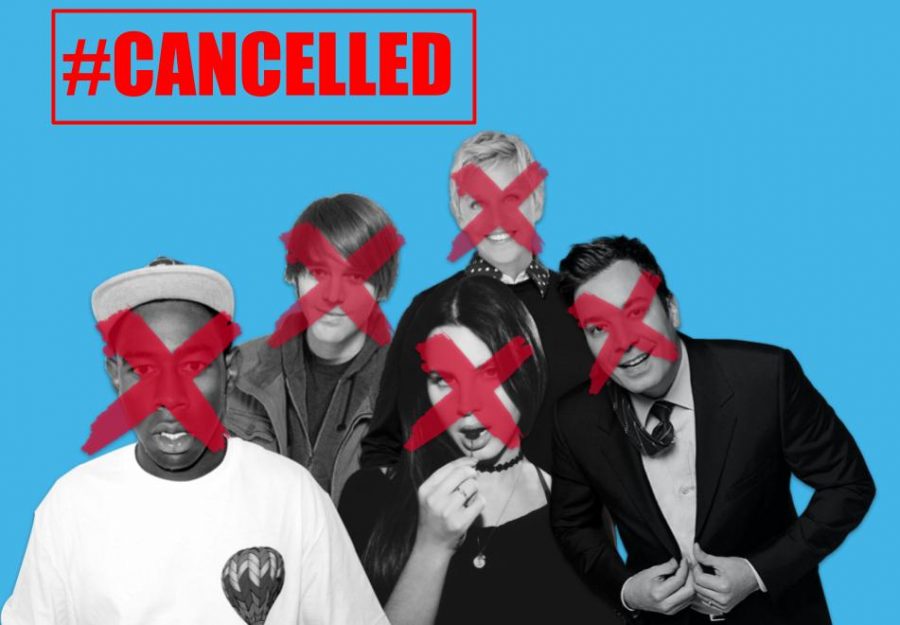“Cancel Culture”: Stop glorifying public figures
The toxicity of “cancel culture” on the internet
Many celebrities have been “cancelled” because of their past actions. However, “cancel culture” is an issue that needs to be fixed.
December 2, 2020
In an era of massive public response to social and political injustice, chiefly in the form of virtual activism, performative activism and fraudulent “wokeness” are bound to follow.
When the public presents a facade of being “woke”, or awareness to issues concerning racial and social justice, simply for the sake of increasing one’s social capital, toxic trends like “cancel culture” entrench themselves in the internet.
“Cancel culture”, the act of publicly withdrawing support for a business, public figure, or celebrity after accusations of problematic behavior erupt and circulate the internet, has led to hundreds of public figures’ falls from grace. In the last year alone, social media platforms like Twitter, Instagram, and TikTok have been catalysts for “exposing” problematic behavior of celebrities like Lana Del Rey, Doja Cat, Tyler the Creator, J.K. Rowling, Shane Dawson, and Ellen DeGeneres.
Notably, many of these celebrities that have suffered from the vicious weapon that is “cancel culture”, are truly deserving of being deplatformed. Shane Dawson, formerly a highly successful YouTuber, was abruptly cancelled over the summer when videos emerged of him saying the n slur, doing black face and admitting to beastiality, among a host of other highly disturbing behaviors. YouTube has since demonetized his three YouTube channels, and Dawson’s public image is most likely perpetually tarnished.
The real issue lies when the public takes behavior out of context, digs up miniscule details about celebrities’ past that could be categorized as offensive, and refuses to forgive those condemned, all under the guise of being crusaders for racial and social activism.
Pop singer-songwriter Lana Del Rey, for instance, was recently dragged through the mud for complaining her music is condemned for glorifying abuse while many other female artists are worshipped for owning their sexuality in an Instagram post. Twitter had a field month with Lana Del Rey’s contentious post, accusing her of being racist because many of the female artists she mentioned were women of color. Despite the fact that the post was in no capacity about race, and entirely about her tainted public image, the accusations did not subside, and the singer was cancelled.
From then on, social media platforms continued to dig up inconsequential details about Lana Del Rey’s past in order to further villainize her. Her past relationship with a cop was weaponized as proof of her racist demeanor.
As easy enough as it was to cancel Lana Del Rey, the internet was less gratuitous with their forgiveness. Although a myriad of celebrities have followed Del Rey in her wake, facing backlash from the internet, Lana Del Rey has had trouble extricating herself from her #LanaDelReyIsOverParty. The singer took to Instagram to clarify her post, revealing her intention was never to be racist. Since then, the singer tweeted, “I don’t care anymore but don’t ever ever ever ever bro- call me racist because that is bullsh*t.”
The problem with celebrities is that the public builds up a glorified image of what they should be like. Their talent, status, humor, and more allows normal people to worship the ground they walk on, and when those public figures do something out of character, chaos ensues. What the internet needs to remember is that although celebrities may appear untouchable, they are normal human beings. Ennobling people that are bound to mess up (after all, they are part of Hollywood) will only cause disappointment when they fracture whatever transcendent image of them one has conjured.
Sure, we need to castrate celebrities when they are found to be genuinely intolerant people, but there are bigger issues to focus on than Celebrity X’s insensitive tweet from a decade ago. This is where it’s blatantly obvious that the “woke” generation behind these condemnations are simply veiling their desire to be a part of a social collective of activists rather than genuine individual devotion to justice issues: the actual problems of people of color and people disadvantaged by socioeconomic status would matter more than internet trends.



